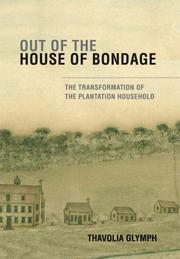| Listing 1 - 3 of 3 |
Sort by
|

ISBN: 9780674039476 0674039475 0674003055 9780674003057 067400440X 9780674004405 Year: 2000 Publisher: Cambridge, MA : Harvard University Press,
Abstract | Keywords | Export | Availability | Bookmark
 Loading...
Loading...Choose an application
- Reference Manager
- EndNote
- RefWorks (Direct export to RefWorks)
Born into the first family of the British stage, Fanny Kemble was one of the most famous woman writers of the English-speaking world, a best-selling author on both sides of the Atlantic. Her autobiographical writings are compelling evidence of Kemble's wit and talent, and they also offer a dazzling overview of her transatlantic world.
Actors --- Plantation owners' spouses --- Plantation owners' wives --- Spouses --- Stage actors --- Theater actors --- Theatrical actors --- Artists --- Entertainers --- Theater --- Kemble, Fanny, --- Kemble, Frances Anne, --- Butler, Frances Anne, --- Butler, --- Kemble, --- Mrs. Butler,
Book
ISBN: 1421424622 9781421424620 9781421424613 1421424614 Year: 2018 Publisher: Baltimore
Abstract | Keywords | Export | Availability | Bookmark
 Loading...
Loading...Choose an application
- Reference Manager
- EndNote
- RefWorks (Direct export to RefWorks)
"Susan Imbarrato tells the story of the Cary family of Chelsea, Massachusetts, who prospered as plantation owners and managers for nearly two decades in Grenada before their fortunes were substantially reversed following the slave revolts of 1795-1796 that upended the sugar trade and marked a significant turning point in the family's financial and social well-being. Working closely with archival materials that include letters, diaries, newspapers, a plantation manual, and business memoranda, the author places the Cary family story within the larger context of the transition from colonial America to the new republic and against the backdrop of the transatlantic sugar trade, the slave revolts, and the early abolitionist movement. With Sarah Gray Cary's quick intelligence and astute assessments as their guide, the Cary family adapts to their shifting fortunes in remarkable ways. This study offers a new perspective on this time period using the extensive mother-son correspondence as they address family matters, share opinions on political and social events, discuss literature and philosophy, and speculate on business and career possibilities. Throughout, Sarah provides a steadying influence that both sustains and encourages, all the while successfully managing households in both Grenada and Chelsea that will eventually include thirteen children. The methodology of this study combines New Historicism with close readings. A must-read for historians, literary scholars, students, and the general public interested in American history and literature, women's history, the transatlantic sugar trade, slavery, abolition, letter writing, family correspondence, the Revolutionary Era, and the new republic" --
Women --- Plantations --- Families --- Plantation owners' spouses --- Family --- Family life --- Family relationships --- Family structure --- Relationships, Family --- Structure, Family --- Social institutions --- Birth order --- Domestic relations --- Home --- Households --- Kinship --- Marriage --- Matriarchy --- Parenthood --- Patriarchy --- Plantation owners' wives --- Spouses --- Farms --- History. --- Economic aspects --- Social aspects --- Social conditions --- Cary, Sarah Gray, --- Chelsea (Mass.) --- Chelsea, Mass.

ISBN: 9780511812491 9780521879019 9780521703987 9780511424267 0511424264 9780511423277 0511423276 0511423780 9780511423789 0511812493 1281775770 9781281775771 9780511422614 051142261X 0521879019 0521703980 1107386519 1107183707 9786611775773 0511421958 Year: 2008 Publisher: Cambridge : Cambridge University Press,
Abstract | Keywords | Export | Availability | Bookmark
 Loading...
Loading...Choose an application
- Reference Manager
- EndNote
- RefWorks (Direct export to RefWorks)
The plantation household was, first and foremost, a site of production. This fundamental fact has generally been overshadowed by popular and scholarly images of the plantation household as the source of slavery's redeeming qualities, where 'gentle' mistresses ministered to 'loyal' slaves. This book recounts a very different story. The very notion of a private sphere, as divorced from the immoral excesses of chattel slavery as from the amoral logic of market laws, functioned to conceal from public scrutiny the day-to-day struggles between enslaved women and their mistresses, subsumed within a logic of patriarchy. One of emancipation's unsung consequences was precisely the exposure to public view of the unbridgeable social distance between the women on whose labor the plantation household relied and the women who employed them. This is a story of race and gender, nation and citizenship, freedom and bondage in the nineteenth century South; a big abstract story that is composed of equally big personal stories.
Plantation life --- Women slaves --- African American women --- Plantation owners' spouses --- Women, White --- Social distance --- Households --- Patriarchy --- Androcracy --- Patriarchal families --- Fathers --- Families --- Male domination (Social structure) --- Patrilineal kinship --- Population --- Home economics --- Distance, Social --- Social interaction --- Social participation --- Social isolation --- White women --- Plantation owners' wives --- Spouses --- Afro-American women --- Women, African American --- Women, Negro --- Women --- Slave women --- Slaves --- History --- Social conditions --- Southern States --- Social life and customs --- Race relations --- Arts and Humanities --- Women, Enslaved --- Enslaved persons --- Enslaved women
| Listing 1 - 3 of 3 |
Sort by
|

 Search
Search Feedback
Feedback About UniCat
About UniCat  Help
Help News
News